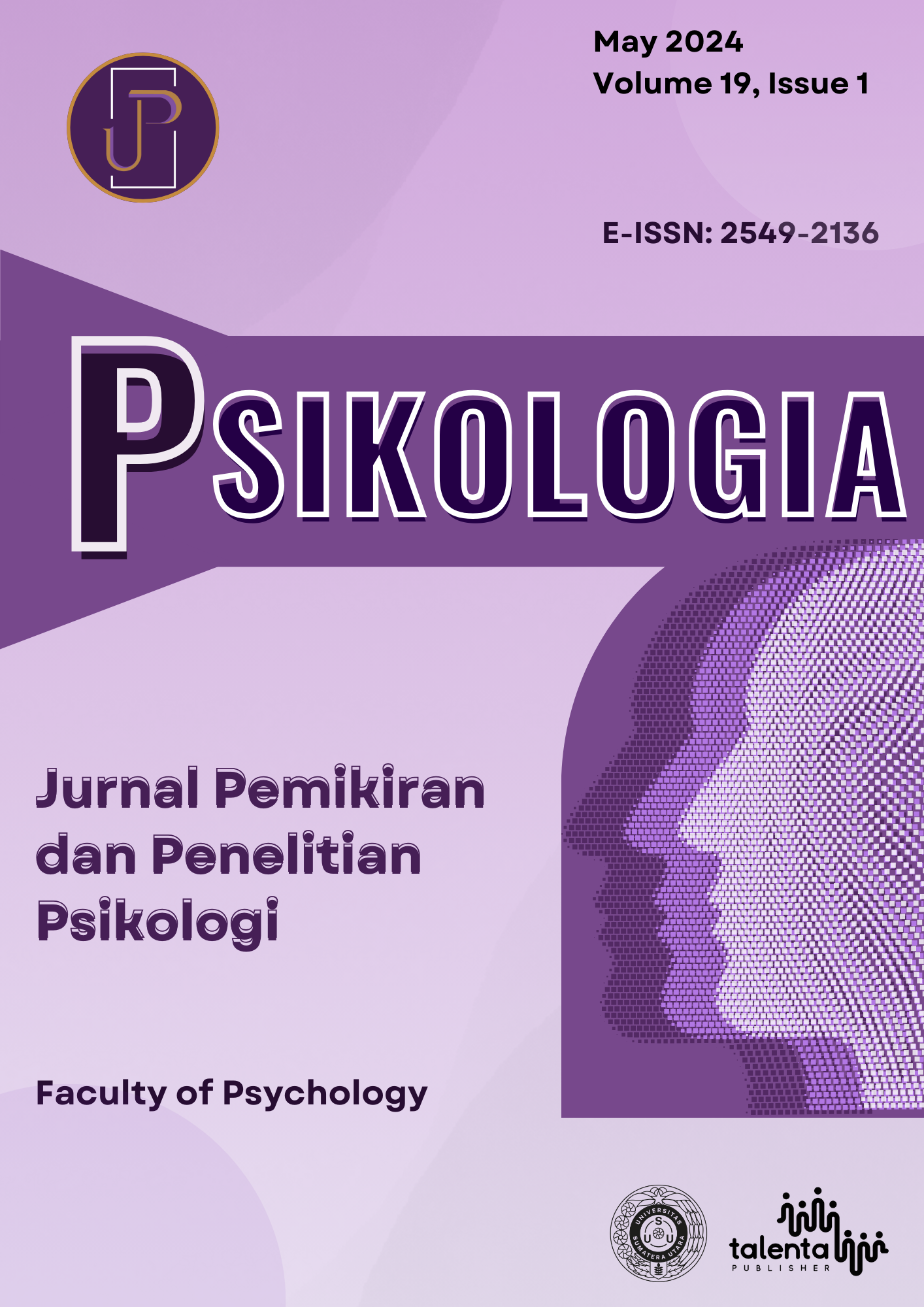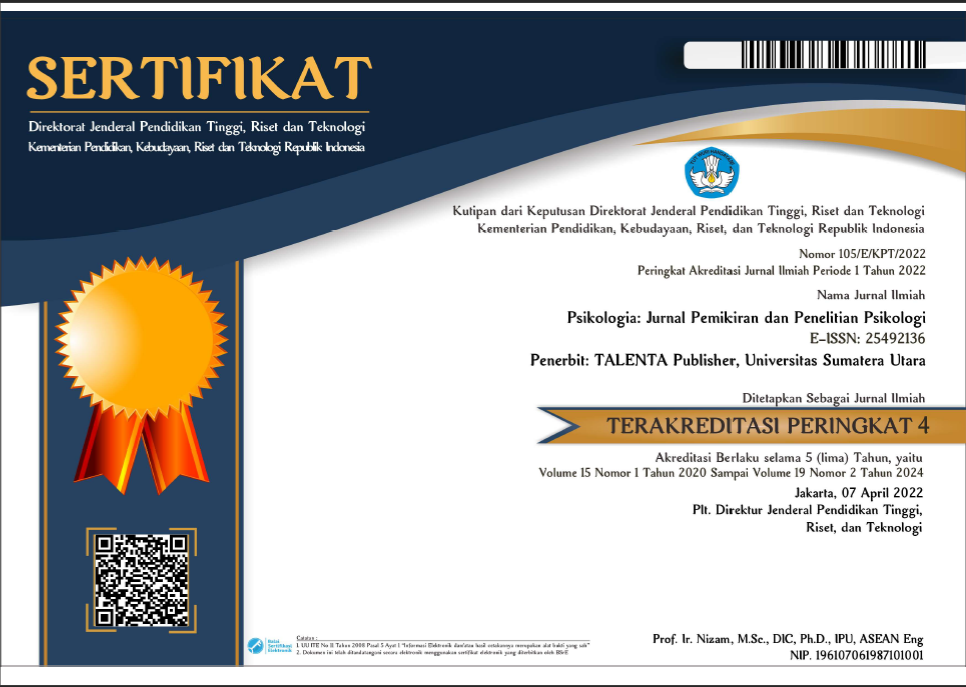How does organizational commitment in employees relate to work engagement in millennial employees in the era of the Fourth Industrial Revolution?
DOI:
https://doi.org/10.32734/psikologia.v19i1.14042Keywords:
work engagement, organizational commitment, employees, millennial generationAbstract
The era of the Industrial Revolution 4.0 requires the world to continue to develop. This affects the performance of human resources at this time. Therefore, employees who are competent in their fields are needed. One of them is millennial generation employees who are known to be able to adapt and control technology. However, millennial employees have characteristics that make them quickly bored, so they easily decide to leave their jobs. This is undoubtedly related to the engagement of employees of the millennial generation. Therefore, millennial generation employees need organizational commitment; by committing, they can increase their sense of attachment to the company. The subjects in this study amounted to 60 millennial-generation employees with the characteristics of working for at least one year and aged between 21 and 41 years. The data collection method in this study used the Work Engagement Scale and the Organizational Commitment Scale. The data analysis technique used is product-moment correlation from Karl Pearson. The results of data analysis were obtained with the correlation coefficient value, which means there is a significant positive relationship between Organizational Commitment and Work Engagement.
Downloads
References
Ahuja, S., & Gupta, S. (2019). Organizational commitment and work engagement as a facilitator for sustaining higher education professionals. International Journal of Recent Technology and Engineering, 7(6), 1846–1851.
Allen, N. J., & Meyer, J. P. (1990). The measurement and antecedents of affective, continuance and normative commitment to the organization. Journal of Occupational Psychology, 63(1), 1–18. https://doi.org/10.1111/j.2044-8325.1990.tb00506.x
Amalia, R. S., & Hadi, C. (2019). Pengaruh work design characteristics, career growth, dan psychological capital terhadap work engagement karyawan generasi milenial di PT. XYZ. Jurnal Psikologi, 15(1), 10–24.
Avicenna, M. (2019). Hubungan komitmen organisasi dengan work engagement pada guru SMK. Universitas Islam Indonesia.
Azwar, S. (2015). Penyusunan skala psikologi (Edisi ke 3). Pustaka Pelajar.
Bakker, A. B. (2011). An evidence based model of work engagement. Current Directions in Psychological Science, 20(4), 265–269. https://doi.org/10.1177/0963721411414534
Bakker, A. B., & Leiter, M. P. (2010). Work engagement: A handbook of essential theory and research. Psychology Press.
Bakker, A. B., & Leiter, M. P. (2010). Work engagement: Introduction in work engagement: A handbook of essential theory and research.
[BPS] Badan Pusat Statistik. (2019). Berita resmi statistik. Bps.Go.Id, 27, 1–52.
[BPS] Badan Pusat Statistik. (2021). Hasil sensus penduduk 2020. Berita Resmi Statistik.
Cahyana, KS., & Prahara, SA. (2021). Work engagement dengan intensi turnover pada karyawan. Intuisi: Jurnal Psikologi Ilmiah, 12(3), 285-294.
Carniege, D. (2018). Tenaga kerja milenial hanya terserap 25 persen. Dalecarnegie. https://www.dalecarnegie.id/sumberdaya/media/media-coverage/tenaga-kerja-milenial-hanya-terserap-25-persen/
Chughtai, A. A., & Buckley, F. (2009). Linking trust in the principal to school outcomes: The mediating role of organizational identification and work engagement. International Journal of Educational Management, 23(7), 574–589. https://doi.org/https://doi.org/10.1108/09513540910990816
Demerouti, E., & Cropanzano, R. (2010). From thought to action: Employee work engagement and job performance. Psychology Press. https://doi.org/https://doi.org/10.4324/9780203853047
Emily, D. G., Wicaksono, B., & Priyatama, A. N. (2016). Hubungan antara motivasi kerja dan komitmen organisasi dengan keterlibatan kerja pada anggota organisasi AIESEC local committee Universitas Sebelas Maret Surakarta. Jurnal Wacana, 8(2), 1–13.
Fiasari, P & Prahara, SA. (2020). Hubungan antara employee engagement dengan job burnout pada karyawan CV. X. Prosiding Konferensi Mahasiswa Psikologi Insonesia 1.0 “Revitalisasi Peran Psikologi dalam Keluarga, Organisasi, dan Komunitas: Tantangan dalam Menyambut Society 5.0â€. Semarang: 29 Agustus 2020. Hal. 184-193.
Field, L. K., & Buitendach, J. H. (2011). Happiness, work engagement and organisational commitment of support staff at a tertiary education institution in South Africa. SA Journal of Industrial Psychology, 37(1), 1–11. https://doi.org/10.4102/sajip.v37i1.946
Gallup. (2021). State of the global workplace: 2021 report. https://www.gallup.com/workplace/insights.aspx
González-Romá, V., Schaufeli, W. B., Bakker, A. B., & Lloret, S. (2006). Burnout and work engagement: Independent factors or opposite poles? Journal of Vocational Behavior, 68(1), 165–174. https://doi.org/10.1016/j.jvb.2005.01.003.
Gravetter, F. J., & Forzano, L. A. B. (2018). Research methods for the behavioral sciences. Cengage Learning.
Hadi, S. (2016). Metodologi riset. Pustaka Pelajar.
Harter, J. (2024). The new challenge of engaging younger workers. https://www.gallup.com/workplace/610856/new-challenge-engaging-younger-workers.aspx
Hidayatullah, S., Waris, A. , Devianti, R. C. , Sari, S. R. , Wibowo, I. A. , & Made, P. (2018). Perilaku generasi milenial dalam menggunakan aplikasi go-food. Jurnal Manajemen & Kewirausahaan.
Hobfoll, S. E., Johnson, R. J., Ennis, N., & Jackson, A. P. (2003). Resource loss, resource gain, and emotional outcomes among inner city women. Journal of Personality and Social Psychology, 84(3), 632–643. https://doi.org/10.1037/0022-3514.84.3.632
Izzati, U.A., & Mulyana, O.P. (2019). Psikologi industri & organisasi. Penerbit Bintang Surabaya.
Jewell & Siegall. 2008. Psikologi industri/organisasi modern. Edisi 2. (terjemahan Pudjaatmaka). Jakarta: Arcan.
Jimad, H. (2021). Kepuasan kerja, komitmen organisasi dan intensi turnover, Jurnal Bisnis & Manajemen, 7(2), 155-166.
Marciano, P. L. (2010). Carrots and sticks don’t work. Carrots & sticks don’t work. McGraw Hill.
May, D. R., Gilson, R. L., & Harter, L. M. (2004). The psychological conditions of meaningfulness, safety and availability and the engagement of the human spirit at work. Journal of Occupational and Organizational Psychology, 77(1), 11–37.
Nitisemito, A. S. (2002). Manajemen personalia (Manajemen sumber daya manusia). Ghalia Indonesia.
Palundun. (2021). Hubungan antara job crafting dengan komitmen organisasi pada anggota polisi di Manado. Skripsi. Fakultas Psikologi, Universitas Mercu Buana Yogyakarta.
Park, J., & Gursoy, D. (2012). Generation effect on the relationship between work engagement, satisfaction, and turnover intention among US hotel employees. International Journal of Hospitality Management, 31(4), 1195–1202.
Rezkya, M.P., Sutartob, J., Prihatinc, T., Yuliantod, A., & Haidar, I. (2019). Generasi milenial yang siap menghadapi era revolusi digital (society 5.0 dan revolusi industri 4.0) di bidang pendidikan melalui pengembangan sumber daya manusia. Prosiding Seminar Nasional untuk Membangkitkan Semangat Pendidikan Pasca Pandemi COVID-19, Semarang: 27 Oktober 2019. Hal. 1117-1125.
Rhoades, L., Eisenberger, R., & Armeli, S. (2001). Affective commitment to the organization: The contribution of perceived organizational support. Journal of Applied Psychology, 86, 825–836.
Ridho, S & Syamsuri, A.R. (2018). Peran dimensi komitmen organisasi terhadap intensi turnover pada guru SMA Swasta. Jurnal Sosial Humaniora dan Pendidikan, 2(1), 64. DOI: 10.32487/jshp.v2i1.293
Rohida, L. (2018). Pengaruh era revolusi industri 4.0 terhadap kompetensi sumber daya manusia. Jurnal Manajemen Dan Bisnis Indonesia, 6(1), 114–136. https://doi.org/10.31843/jmbi.v6i1.187
Salanova, M., Agut, S., & Peiró, J. M. (2005). Linking organizational resources and work engagement to employee performance and customer loyalty: The mediation of service climate. Journal of Applied Psychology, 90(6), 1217–1227. https://doi.org/10.1037/0021-9010.90.6.1217
Samsuni. (2017). Manajemen sumber daya manusia. Al Falah, 17(31), 113–124.
Satata, D.B.M. (2020). Pengaruh organizational commitment terhadap work engagement pada pekerja di bidang pengembangan teknologi informasi. iJurnal Muara Ilmu Sosial humaniora dan Seni, 4(2), 349-357. DOI: 10.24912/jmishumsen.v4i2.9306.2020
Schaufeli, W. B., Bakker, A. B., & Salanova, M. (2006). The measurement of work engagement with a short questionnaire: A cross-national study. Educational and Psychological Measurement, 66(4), 701–716. https://doi.org/10.1177/0013164405282471
Schaufeli, W. B., Salanova, M., Gonzales-Roma, V., & Baker, A. B. (2002). The measurement of engagement and burnout: A two sample confirmatory factor analytic approach. Journal of Happiness Studies, 3, 71–92.
Srimulyani, V. A. (2009). Tipilogi dan anteseden komitmen organisasi. Jurnal Ilmiah Widya Wana, 33(1), 1–20.
Sukoco, I., Fuadah, Dian, N., & Muttaqin, Z. (2020). Work engagement of millennial generation employees at PT. X Bandung. Jurnal Pemeikiran Dan Penelitian Administrasi Bisnis Dan Kewirausahaan, 5(3), 263–281.
Surohmat, Y., & Istiyani, Y. (2022). Pengaruh komitmen organisasi dan work engagement terhadap kinerja karyawan (Studi UPBU Rahadi Oesman Kabupaten Ketapang Kalimantan Barat). Jurnal Kewarganegaraan, 6(3), 5656-5661.
Suryadi, B. (2015). Generasi Y: Karakteristik, masalah, dan peran konselor. Seminar Dan Workshop Internasional MALINDO.
Wulandari, A., & Prahara, S. A. (2020). Emotional intelligence and work engagement in working mother. Journal of Psychology and Instruction, 6(2), 181-186.
Yuswohady. (2016). Millennial Trend 2016. https://www.yuswohady.com/2016/01/17/millennial-trends-2016/
Zhang, J.-C., Zhang, Z.-Y., Ling, W.-Q., & Xie, J. (2015). Organizational commitment, work engagement, person-supervisor fit, and turnover intention: A total effect moderation model. Social Behavior and Personality, 43(10), 1657–1666.
Downloads
Published
How to Cite
Issue
Section
License
Copyright (c) 2024 Novia Jakayati, Sowanya Ardi Prahara

This work is licensed under a Creative Commons Attribution-ShareAlike 4.0 International License.









